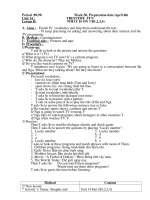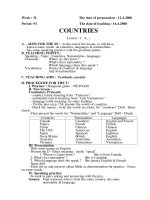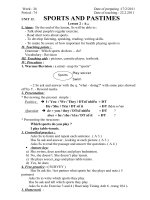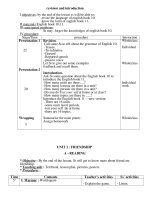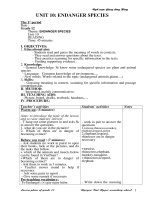giáo án Anh 11
Bạn đang xem bản rút gọn của tài liệu. Xem và tải ngay bản đầy đủ của tài liệu tại đây (387.41 KB, 48 trang )
Unit 1 FRIENDSHIP
A. READING
Task 1
Answer
1. mutual 4. acquaintance; friend
2. incapable of 5. give-and-take
3. unselfish 6. loyal to
7. suspicious
Task 2
Answer
B(Conditions of true friendship)
Task 3
Answer
1. The first quality for true friendship is unselfishness. It tells us/me that a man who is
concerned only with his own interests and feelings cannot be a true friend.
2. Changeable and uncertain people are incapable of true friendship because they take up an
interest with enthusiasm, but they are soon tired of it, and they feel the attraction of some
new object.
3. The third quality for true friendship is loyalty. It tells us/me that the true friends must be
loyal to each other, and they must know each other so well that there can be no suspicions
between them.
4. there must be a mutual trust between friends because if not people cannot feel safe when
telling the other their most intimate secrets.
5. Talkative people can’t keep a friend long because they cannot keep secret, either their own
or those of others
6. the last quality for true friendship is sympathy. It tells us/me that to be a true friend you
must sympathize with your friend. Where there’s no mutual sympathy between friends,
there’s no true friendship
B. SPEAKING
Task 1
Answer
OK, look at the picture carefully. How many people are there in the picture? Can you guess
the age of each of them?...Now let us start with the physical description of the man. Is he tall or
short?...
Task 2
Task 3
C. LISTENING
Task 1
You will hear Lan and Long talk about their best friends Ha and Minh. Listen to their talks
and do the tasks that follow.
Tapescript
Lan’s Talk
My best friend is Ha. We’ve been friends for a long time. We used to live in Nguyen Cong
Tru Residential Area in Hanoi. Her family move to Haiphong in 1985. It is said that Haiphong
people are cold, but Ha is really, really friendly. I first started to get to know her when I was
going on a two-day trip to Do Son last year and I didn’t know anybody there. I gave Ha a ring
and she was so friendly, she said, “Oh, I’ll come to visit you. “So she rode on her motorbike to
Do Son and twenty minutes later she was there. She stayed with me for two days. She
happened to know a lot of people there, so she introduced me around, and we’ve been best
friends ever since.
Long’s Talk
My best friend is Minh. We met in college. I was there singing and Minh was a guitarist. So
we worked together a lot. Minh has a great sense of humour, he’s very, very funny, and that’s
one of my favourite things about him. And over the years, we have been through good times
and bad times with each other, and that’s one of the things I like best about him. And we have
a lot of the same interests. We like to go to plays and movies together. But when we’re going
through a rough time, he’s really a good friend, and he’s a very god listener, and he always
helped me though.
Answer
Lan’s Talk:
1 2 3 4 5 6
F F T F T F
Long’s Talk:
1 2 3 4 5
F F T T T
Task 2
Answer
How and where they met? What they like about their friends?
Lan
- They used to live in the same
apartment building in Hanoi.
- Lan went on a holiday to Do Son and
Ha went there to help her.
- Ha’s very friendly and helpful.
- Ha’s sociable. She’s got many friends in
Do Son and she introduced Lan around.
-
Long - They met in college.
- Minh played the guitar, Long was a singer.
- They worked together
- Minh has a sense of humour.
- Minh likes to go to plays and movies.
- Minh is a good listener.
- Minh is friendly and helpful.
D. WRITING
E. LANGUAGE FOCUS
Pronunciation
• Listen and repeat.
• Practise reading these sentences
Grammar and vocabulary
Exercises 1.
Answer
1. Who wants some thing to eat?
2. I have some letters to write.
3. I am/was delighted to hear the news.
4. My mother has some shopping to do.
5. You always have too much to talk about.
6. It’s lovely to see you again.
7. It’s/was too cold to go out.
8. I’m/am happy to know that you have passed the exams
Exercises 2.
Answer
1. The police watched them get out of the car.
2. They let him write a letter to his wife.
3. I heard them talk in the next room.
4. The customs officer made him open the briefcase.
5. The boy saw the cat jump through the window.
6. Do you think the company will make him pay some extra money?
7. I felt the animal move toward me.
8. Do you think her parents will let her go on a picnic?
Unit 2 PERSONAL EXPERIENCES
A. READING
Task 1
Answer
1. glanced 2. making a fuss 3. embarrassing
4. idols 5. sneaky
Task 2
Answer
1 2 3 4 5 6
D B F E A C
Task 3
1. A red floppy cotton hat.
2. So that she could buy the hat for herself. To buy the hat for herself.
3. A wad of dollar notes exactly like the ones her father had given her before.
4. Because she didn’t like to make a fuss.
5. She bought the hat with it.
Suggest: put up a notice at the school board/ get on the same bus the next day and look for the boy
to return the money to him/ do nothing/ keep it a secret/ tell her father and ask him for advice,…
B. SPEAKING
Task 1
Answer
1 2 3 4 5
d c a b e
Task 2
Answer
1 2 3 4 5 6 7 8
b d h a e g c f
Task 3
C. LISTENING
Task 1
Answer
1 2 3 4 5
T F F F T
Tapescript
Unforgettable Experiences
Interviewer: This is Radio 3. In our ‘unforgettable Experiences’ programme tonight we talk to
Christina, a successful business woman. Hello Christina, welcome to our
programme.
Christina: Hello and thank you! It’s nice being with you tonight.
Interviewer: Christina, could you tell our audience about the most memorable experience in
your life?
Christina: Well, my most unforgettable experience happened thirteen years ago, when my
house burned down.
Interviewer: Really? How did it happen?
Christina: the fire started in the kitchen where I forgot to turn off the gas stove.
Interviewer: What were you doing at that time?
Christina: I was sleeping when I was suddenly woken up by terrible heat. I opened my eyes
to find myself surrounded by walls of fire.
Interviewer: That’s terrible! How did you escape?
Christina: I was terrified. Then I heard my mother’s voice calling my name. I rushed to her.
She carried me out. Luckily, I got away without even a minor burn.
Interviewer: Not many people are so lucky. Did the fire affect you in any way?
Christina: Oh, yes. Yes, very much, in fact. Although I lost many things in the fire, the
experience helped me to grow up.
Interviewer: What do you mean?
Christina: Well, before the fire, I was selfish. I always complained to my mother about how
small my room was, or how few clothes I had. Then the fire came and destroyed
everything we owned. But I slowly began to realize that I didn’t really need my old
thing. I just needed my family. After all, you can get new clothes anytime, but a
family can never be replaced.
Interviewer: I see, so the fire took many things from you, but it gave you something, too.
Christina: Exactly. It taught me to appreciate my family more than things
Suggest
Why do you think it’s true/false?
1. She is a business woman.
2. It happened thirteen years ago
3. It started in the kitchen because she forgot to turn off the gas stove.
4. She was sleeping.
5. Her mother did
Task 2
Answer
1. small 2. everything 3. family
4. replace 5. took 6. appreciate
D. WRITING
Example:
-when it happen: two years ago / when I was in grade 10 / when I was 10 …
-where it happened: in my house / at school / in the street / in a holiday resort …
-how the experience affect you: it changed my outlook on life / it made me more careful whenever I
… / it made me appreciate … more / it gave me more confidence in … /it taught me a lesson …
E. LANGUAGE FOCUS
Pronunciation
• Listen and repeat.
• Practise these sentences.
Grammar
Exercises 1.
Answer
0. lives 1. invites 2. sets
3. gets 4. waves 5. promises
6. carries 7. contains 8. has baked
9. is 10. is shining 11. are shining
12. is
Exercises 2.
Answer
1. broke / was playing
2. wrote / was
3. was working / broke
4. started / were walking
5. told / were having
6. didn’t listen / was thinking
7. phoned / didn’t answer / were (you) doing
8. was not wearing / didn’t notice / was driving
Exercise 3
Answer
1. had eaten / arrived
2. found / had taken
3. got / had closed
4. got / had left
5. got / had arrived
6. paid / had phoned
7. went / said / hadn’t arrived
8. had looked / asked / cost
Unit 3 A PARTY
A. READING
Before you read
Answer
1. The people in the picture 1 are friends and the people in the picture 2 belong to family.
2. The children in picture 1 are celebrating a birthday and the people in picture 2 are
celebrating a golden wedding anniversary
While you read
Task 1
Answer
1. Birthday party
2. both
3. both
4. wedding anniversary party
5. wedding anniversary party
6. wedding anniversary party
7. Birthday party
Task 2
Answer
1. Lisa’s family and friends are at her seventh birthday party.
2. Everyone eats cakes and ice cream at the birthday party.
3. Lisa opens birthday cards and presents from her family and friends.
4. Many American over age 30 don’t like to talk about their age.
5. Fifty years ago, Rosa and Luis got married
6. People call the 50
th
anniversaries the “golden anniversaries.”
7. Rosa and Luis are happy to be together for their golden anniversaries
After you read
B. SPEAKING
Task 1
Task 2
Task 3
Task 4
C. LISTENING
Before you listen
While you listen
Task 1
Answer
1 2 3 4 5
F F F T F
Tapescript
Mai is my neighbor. She turned 16 recently and her parents held a birthday party for her. I was
one of those invited.
The party began at about three in the afternoon. There were about twenty of us gathering in
Mai’s house. She didn’t like having the party at a restaurant because it is noisy and expensive.
We gave presents to Mai and she happily opened them. It must really be exciting to receive all
those presents. After that Mai’s mother served us soft drinks and biscuits. We then listened to
music and played cards. The winners were given prizes. At about four thirty Mai’s mother brought
out birthday cake. It was beautifully decorated with pink and white icing. Sixteen colourful candles
sat in the middle of the cake. We all clapped our hands eagerly and sang “Happy Birthday” as she
blew out the candles and cut the cake. We helped ourselves to slices of the delicious cake and
sang all the song that we knew.
Finally at about six in the evening the party came to an end. We were all tired but happy. The
parents of other children came to collect them by motor bikes. I helped Mai and her mother clean
up the mess we had made. After that I walked home, which was only three doors away.
Task 2
Answer
1. She was 16 years old.
2. because it is noisy and expensive.
3. She served them soft drinks and biscuits at the beginning of the party.
4. The birthday cake was brought out at about four thirty.
5. It was beautifully decorated with pink and white icing (and sixteen colourful candles sat in
the middle of the cake).
6. They clapped their hands eagerly and sang “Happy Birthday”.
7. (It finished) at about six in the evening.
After you listen
D. WRITING
Task 1
Task 2
Answer
1. at my house 3. refreshments 5. winners
2. to come 4. to cook 6. by Monday
Task 3
E. LANGUAGE FOCUS
Pronunciation
• Listen and repeat
• Practise these sentences
Grammar and vocabulary
Exercise 1
1. having 4. practising
2. getting 5. to see
3. to tell
Exercise 2
1. B 4. B
2. A 5. A
3. B
Exercise 3
1. D 4. B
2. C 5. C
3. B
TEST YOURSELF A
1. Listening
Answer
1 2 3 4 5
A D B A C
Tapescript
I’ve known James for 25 years. We first met when he moved to my town. He went to a
different school but we became friends because he lived next door to me. We’ve know each
other since then, but we haven’t kept in touch all that time … we lost contact with each other
when I moved to Scotland in the 1970s for my job …I didn’t go to James’ wedding but he came to
mine. …And now? Well, I’ve been living here in Brighton since 99, and these days I see James
about once a week, usually in the park where I walk my dog, or in the pub for lunch with another
friends that we’ve known for about the same length of time. We haven’t been doing that for very
long but it’s good to get all of us together.
2. Reading
Answer
1. Because they had been childless for ten year after they were married.
2. To take some photographs of the happy family.
3. The boys were dressed in a smart, brand new outfit and looked like a little prince.
4. Because he was interested in the toys
5. He felt that it was delightful and looked forward to the next day to have the films developed
3. Grammar
Answer
a) 1. B 2. A 3. B
b) 1 – to see 3 – to phone 5 – to be met 7 – not to attend
2 – To be 4 – pay 6 – to be appointed
c) 1 – send 3 – remain 5 – keep in touch with
2 – lost contact with 4 – rely on
4. Writing
Article suggest:
Lan is one of my best friend. We have many things in common so we often meet and do things
together. We live on the same street. It’s interesting that her birthday is also in June but a week
before mine so we often help each other to celebrate it. Last June we had a very special birthday
parties. We didn’t have it at home as usual but we had our birthday celebrations at San Son beach
during a two week holiday with our parents. We spent the morning swimming and playing on the
beach. We had seafood for lunch at the restaurant. In the afternoon we went shopping around the
area and bought lots of souvenirs. Though I did not have many presents on my last birthday, but I
enjoyed it most of all.
Unit 4 VOLUNTEER WORK
A. READING
Before you read
While you read
Task 1
Answer
1. voluntary
2. voluntarily
3. volunteers
4. volunteers
Task 2
Answer
1. A 2. D 3. B 4. D
Task 3
Answer
1. They usually visit these places. They read books to the people there, play games with
them or listen to their problems.
2. They give care and comfort to them ( and help them to overcome their difficulties)
3. During summer vacations, they volunteer to work in remote or mountainous areas ( to
provide education for children).
After you read
What kind of voluntary work do people usually do ?
How do they usually do it?
Why do they do it?
B. SPEAKING
Task 1
Answer
Taking part in an excursion.
Participating in the English speaking club.
Joining in the Green Saturday Movement.
Task 2
Task 3
What kind of volunteer work do you usually take part in?
What do you usually do in that kind of volunteer work?
What do you think about that kind of volunteer work?
C. LISTENING
Before you listen
While you listen
Task 1
Tapescript
Spring school is an informal school. It provides classes to disadvantaged children in Ho Chi
Minh City. Around 30 street children live and study at the school and about 250 children with
special difficulties from District 1 regularly attend classes.
The Organization for Educational Development co-operate with Spring School to set up
English classes in 1998. Dance, theatre, singing and folk music classes were set up a year later.
Children from these classes participate in fundraising performances. They raise money to
continue their English and Performance Arts classes.
Spring School requires volunteers to help organise their fundraising dinner held annually in
June. This is an exciting night in which children dance, sing and play music at one of largest
hotels in Ho Chi Minh City. They also need foreign volunteers to contact sponsors and help to
expand the school activities. Volunteers are required from February until July to help organise
these events.
It is hoped that more schools like Spring School will soon be found in other cities in Vietnam.
Answer
1. informal
2. 30 street children
3. 250 children (with special difficulties)
4. 1998
5. volunteers, June
Task 2
Answer
1. It provides classes to disadvantage children in Ho Chi Minh City.
2. dance, theatre, singing and folk music classes were set up in 1999.
3. Because they need money to continue their English and Performance Arts classes.
4. They dance, sing and play music at one of largest hotels in Ho Chi Minh City.
5. Because they need help to organise their fundraising dinner held annually in June.
D. WRITING
Task 1
• The opening of the letter: Dear Sir or Madam
• The amount that is donated: I am very happy to receive a donation of $500 from your
company some days ago.
• How the money is used: the money will help us to repair the old school building and build a
new block of flats for the handicapped students.
• How the receipt is issued: We will certainly issue a receipt as soon as possible.
• The gratitude to the donor: I would like to express our thanks for the donation from your
company.
• The closing of the letter: I look forward to hearing from you soon. Yours faithfully.
Task 2
• The opening of the letter
• The amount that is donated
• How the money is used
• How the receipt is issued
• The gratitude to the donor
• The closing of the letter
E. LANGUAGE FOCUS
Pronunciation
• Listen and repeat.
• Practise reading aloud these sentences.
Grammar
Exercise 1
Answer
1. hearing 3. behaving 5. spending 7. starting
2. bending 4. meeting 6. waiting
Exercises 2
Answer
1. burning, rising 3. lying 5. preparing 7. modernizing
2. reading 4. shopping 6. trying
Exercise 3
Answer
1. having made 3. having been 5. Having read
2. Having been 4. Having tired 6. Having taken
Unit 5 ILLITERACY
A. READING
Before you read
_ Suggest question :
Where do you think the class is?
What do you think of the people in the class? Are they at the same age?
What do you think of the teacher?
What is this class different from your class?
While you read
Task 1
Answer
Task 2
Answer : D
Task 3
Answer
1. 94% of the population
2. The campaign for illiteracy eradication
3. 600 students in 2000 and 800 students in 2001
4. They willingly/ voluntarily spent their vacations teaching ethnic minority illiterate people to
read and write.
5. Illiteracy will soon be eradicated.
After you read
B. SPEAKING
Task 1
Answer
1 2 3 4 5
b – g a – e d – f c – j i – h
Task 2
Task 3
C. LISTENING
Before you listen
While you listen
Task 1
Answer
1 2 3 4
D B B B
Task 2
Answer
1. The survey/ It took place in Perth.
2. 80 percent of the students.
3. They think that they should be allowed to give some input into (be involved in ) school
decision making.
Tapescript
In an informal survey carried out in Perth, Western of Australia, students were asked to give
their views on what makes an effective school. 80 percent of the students felt that mutual respect
in the classroom was essential for affective learning to take place. This implied that the students
should be treated as individuals with both their strengths and their weaknesses. 60 percent of the
students felt they should be encouraged to set realistic goals for their own learning, and to have
positive attitudes towards themselves and others.
About 55 percent of the students expected their teachers to be motivated and interested in
what they were doing; this would then reflect in the performance of the students. Nearly all the
students believed that learning should be centered on important life skills such as
communication, building self-respect and self-confidence, the ability to learn from failure, and
time management, suited to the maturity of the students concerned.
One hundred percent of the students felt that the social side of school was an important as
academic activities. The older students felt that they should be allowed to give some input into
school decision making which had a direct effect on students
After you listen
D. WRITING
Task 1
Answer
1 – varied 3 – who 5 – different 7 – dramatically
2 – rise 4 – number 6 – between 8 – fot
Task 2
E. LANGUAGE FOCUS
Pronunciation
• Listen and repeat
• Practise reading the dialogue
Grammar
Exercise 1
Answer
1. They promised to come back again.
2. The lifeguard advised us not to swim too far from the shore.
3. John asked Peter to close the window.
4. The teacher encouraged Eric to join the football team.
5. John promised to give it to him the next day.
6. My mum wanted Lan to become a doctor.
7. My sister reminded me to lock the door before going to school.
8. His boss advised him to go home and rest for a while.
Exercise 2
1. advise
“You should not drink too much beer. “
He advised me not to drink too much beer.
2. invite
“Come and see me whenever you want.”
She invited me to come and see her whenever I wanted.
3. want
“Please don’t smoke in my car.”
John wanted me not to smoke in his car.
4. tell
“ Sue, give me your phone number.”
He told Sue to give him her phone number.
5. remind
he reminded me to give the book back to Joe.
6. promised
He promised not to do it again.
7. agree
He agreed to wait for me.
8. ask
John asked her to lend him some money.
Unit 6 COMPETIONS
A. READING
Before you read
Answer
a. Quiz “Road to Mount Olympia”.
b. London Marathon.
c. Sao Mai Television Singing Contest.
d. Olympic Games.
While you read
Task 1
Answer
1. d 3. e 5. b
2. f 4. c 6. a
Task 2
Answer
1. The representatives of three classes of the (speaker’s) school took part in the annual final
English Competition last Sunday.
2. Its aim was to stimulate the spirit of learning English among students.
3. The Student’s Parents Society sponsored the competition.
4. They had to complete five activities in all. On competition of each activity, they had to
answer the questions in the worksheets within two minutes.
5. They had to observe and score the students’ performance. A maximum score for each
activity was 15. At the end of the competition they would announce the total score of each
group. The group that got the highest score would be the winner.
6. The winner would be awarded a set of CDs for studying English and an Oxford Advanced
Learner’s Dictionary.
Task 3
Answer
1. In Activity 5, Hung was unable to recite/ complete the poem (he could not remember the
last sentence)
2. Having achieved the highest score, Group B became the winner of the competition.
3. Group C lost the game because they just got 60 points.
4. Nga encouraged her group by saying “For me most important thing was our participation in
the competition and the enjoyment we had from it”.
After you read
B. SPEAKING
Task 1
Task 2
Examples
A: What do you think of the general Knowledge Quiz?
B: Oh, it’s great. It’s an opportunity to test my general knowledge.
Teacher: What do you think of the English competition?
Student: Oh, it’s interesting. It’s a good time to practise my English.
Task 3
C. LISTENING
Before you listen
While you listen
Task 1
Answer
T F
1. √
2. √
3. √
4. √
5. √
6. √
Task 2
Answer
1. (He came from) New York.
2. (She became the first official female champion) in 1972.
3. 8 ( women started and finished the race in 1972)
4. 6164 (runners joined the Boston Marathon in 1984)
After you listen
Tapescript
Trang: What are you reading Paul?
Paul: The history of Boston Marathon.
Trang: It sounds interesting! How often is it held?
Paul: Every year, in the USA.
Trang: When did it begin?
Paul: In 1987. And the same year, John McDermott won the first Boston Athletic Association
Marathon.
Trang: Who was John McDermott? Where did he come from?
Paul: He was the first man who won the first Boston Marathon in the USA. He came from New
York.
Trang: How long did it take him to reach the finish?
Paul: He clocked 2 hours 50 minutes and 10 seconds.
Trang: Did women have right to participate in long distance running?
Paul: Yes… But not until 1967, women were formally accepted to take part in the Boston
races…. A few years later, Kuscsik became the first official female champion.
Trang: When did she win the race?
Paul: In 1972. There were 8 women starting the race and all 8 finished.
Trang: Is the race held for only American people?
Paul: NO. Each year, more runners from every part from every part of the world join it. In 1984,
6164 runners from 34 countries ran in the marathon.
Trang: What are the rules of the Boston Marathon?
Paul: The Boston race is about 42 km. Runners have to go through 13 towns during the race. It
ends in the centre of Boston.
Trang: Oh, that’s great. Thanks a lot, Paul.
D. WRITING
Task 1
Structure : Could you please ……………..?
Task 2
Answer
Dear Thu Trang,
Thank you for your letter and welcome to our English Speaking Competition. Here are some details
about the competition:
The number of participants is limited – just 25. the competition is held on 25 November 2006, at
106 Tran Hung Dao Street, Hoan Kiem District, Hanoi. It starts at 8.00 p.m. Contestants should be
present one hour before the competition for registration.
For more information please contact me on the phone number: (04)9424894, and e-
mail:
Best wishes,
Kate Johnson
Secretary.
E. LANGUAGE FOCUS
Pronunciation
• Listen and repeat.
• Practise reading these sentences
Grammar
Exercise 1
